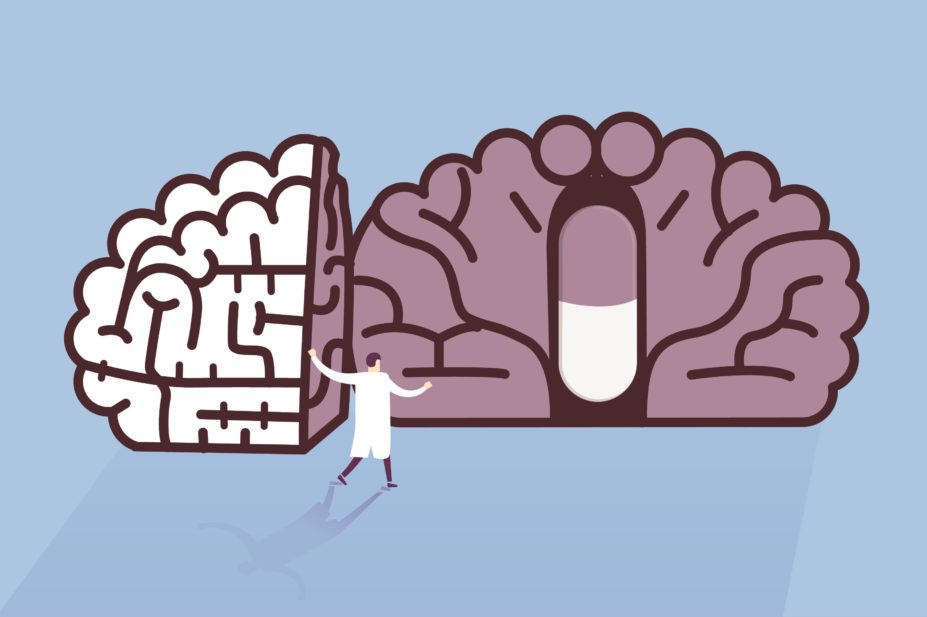
Shutterstock.com
A recent meta-analysis by Andrea Cipriani and colleagues from the Department of Psychiatry at the University of Oxford concluded that antidepressants do not have a clear advantage for childhood and adolescent depression[1]
. The research received much media attention and was used as another opportunity to discredit antidepressant medicines. However, much of the media coverage ignored the fact that the paper did not actually show that antidepressants do not work in this age group, just that the evidence was of such low quality that a conclusion of efficacy could not be made[2]
. The uncritical promotion of psychological therapies as the obvious safe and effective alternative to antidepressants was concerning. Even the comment piece in The Lancet assumed that “evidence-based psychotherapy” was the obvious alternative[3]
.
There has been huge growth in psychological therapies in the UK, with Improving Access to Psychological Therapies — an NHS England initiative that aims to increase access to psychological treatments — receiving £118m annually from 2012 to 2019 to increase services. This investment has partly been fuelled by uncritical reinforcement of the view voiced by clinicians and the media that psychological therapies are a safe and effective alternative to antidepressants[4]
. This viewpoint needs to be challenged because the evidence base for psychological therapies is nowhere near as robust as many health professionals assume.
Flawed research methods
Consider this scenario: in response to the need for an effective and safe alternative drug treatment for depression, my pharmacist colleagues and I have developed a therapy called ENC. We have carried out a trial to prove its effectiveness which involved handpicking English-speaking patients and splitting them into two groups. We engaged with the first group (ENC group), took an interest in their problems and talked to them. The other group were told that we knew they were depressed but we were not going to treat them and instead put them on a 16-week waiting list. After 16 weeks, those in the ENC group were much better than those in the group we abandoned. We know the treatment is safe and does not have any side effects, so we did not ask the patients whether or not they had experienced any.
Would the scientist in you take this seriously? Of course not. It was not randomised, not double blind, there was no matched placebo or equivalent control group. It was carried out in an expert centre with handpicked, English-speaking patients and there was no systematic investigation of adverse effects. The analysis was of study completers rather than intention-to-treat, inflating its apparent effectiveness by ignoring dropouts, which would not satisfy any regulator worldwide were this a drug treatment. The trial did not have to be registered anywhere in advance so, if it failed, it probably would not have been published. Plus a waiting list control of 16 weeks would lead to eventual treatment starting much later, something that is, arguably, unethical.
Sadly, this scenario is not as far-fetched as you might think – it is indicative of the quality of the evidence for the efficacy of psychological therapies in depression, a potentially life-threatening, recurrent and highly distressing condition, with numerous and serious risks to the individual and others. These include harm to relationships, a risk of suicide, cognitive impairment[5]
, hippocampal atrophy[6]
, substance misuse and a 2.5 times increased risk of dying early[7]
.
Trial design flaws
Rather like the ENC trial, one of the big problems with the evidence base for psychological therapies is trial design. The use of waiting lists as a control group should be open to criticism.
Patients are divided into two groups. Giving one group the intervention while the other is put on a waiting list is clearly an open trial strategy. It does not compare a treatment with a matched or equivalent control. In medicine trials, such a design would not be credible and would probably be considered unethical. The 2010 National Institute for Health and Care Excellence guidance on depression[8]
defends waiting lists as a valid trial design by noting a review (19 studies, 221 patients) in which 20% of people improved within 4–8 weeks and 50% improved within 6 months while on a waiting list[9]
. However, a much larger network meta-analysis (49 studies, n=2730) showed that someone was nearly three times more likely to respond to “no treatment” than being on a “waiting list”[10]
. So, in fact, doing nothing is better than being put on a waiting list. It is hard to see how psychologists can defend testing their treatments against a waiting list control. Also, one might wonder how effective antidepressants would be in trials if compared with a waiting list rather than in a randomised double-blind comparison with a matched placebo.
There is evidence of publication bias for psychological therapies, with effect sizes higher than expected overall and much higher in smaller or low quality studies[11],[12]
. This has also been identified in some pharma-led depression trials. Study validity assumes that psychological therapies carried out in a local area are as effective as those carried out by specialists at expert centres. We also do not know if they would work with people of different cultures, who may not speak English fluently and who may have less capacity to cope with the therapy.
Adverse effects
Like medicines, psychological therapies carry adverse effects. For example, quoting from a psychotherapy study in depressed adolescents, “emergent suicidality is a common occurrence in psychosocial treatment of adolescent depression, with rates similar to those reported recently in antidepressant trials”[13]
. In this trial, suicidal ideation was 12.5% (one in eight patients). This may not be a representative estimate but, unusually, adverse effects were specifically measured and reported in this study. Suicidal ideation has been reported to be higher with antidepressants than with psychological therapies (18.6% versus 5.4%) based on limited evidence[14]
, although this seems age-related, with the risk dropping as age increases past adolescence[15]
.
Other adverse effects of psychological therapies can include withdrawal reactions (e.g. distress) on abrupt discontinuation or completion of sessions.
Another possible “adverse effect” is the withholding of other treatments, such as antidepressants in adolescent depression. I vividly recall running a group session in Norfolk for parents of adolescents with mental health problems. The mother of a 17-year-old with depression said her daughter “had tried cognitive behavioural therapy and that made her worse, but the GP will not prescribe antidepressants until she is 18, and now all I’m trying to do is keep her alive until she gets to 18 so she can be treated properly.” This was not an isolated remark.
Strong evidence
Antidepressants are effective regardless of a patient’s language, IQ, race, background, personal relationships, and the quality of the therapist and the prescriber. They start to work in four hours[16],[17]
, there are no waiting lists or restrictive criteria for acceptance for treatment, and they can start to work even when the individual is too depressed to engage with any type of therapy. Antidepressants reduce the risk of suicide in adults[18]
, but in adolescents the rate of suicidal ideation is slightly higher[15]
. In terms of numbers needed to treat (NNT), the evidence base for relapse prevention is 3.5 (P<0.00001)[19]
, one of the strongest effects in medicine. In comparison, statins have an NNT of 30.
Many registration trials of antidepressants over 4–8 weeks still show efficacy over placebo, which is remarkable considering placebo response has been increasing steadily over the past few decades. Placebo is often equated with nothing, but this is wrong, nor is it no treatment or a waiting list. In a placebo-controlled trial, the patient and prescriber know the patient might be having an active treatment (a 50% chance if there are just two arms, 66% if there are two active arms). Comparing two active treatments (with no placebo arm) produces a mean 13% (65% versus 58%) higher response than the response to an antidepressant versus placebo, because both groups of participants know they are receiving an active treatment[20]
. But the doubt also adds uncertainty and may level-out the response to placebo and active intervention. More frequent assessments inflate the placebo response. Trial differences also assume that everyone responding to placebo would also have responded to an antidepressant, which, if not true, would further separate the drug-placebo response. In a condition where hopelessness can be a prominent symptom, any treatment is enormously reassuring and can lead to some short term improvement, but placebo response does not generally show an enduring response. The fact that antidepressants can show efficacy in the relatively short term (4–8 weeks) and in the long term (years) against placebo is indicative of how effective they are.
Not perfect
There is no doubt that there are dangers associated with antidepressant use so they must be used carefully, such as starting on a low dose, increase the dose slowly to avoid any heightened anxiety, and monitor carefully for treatment-emergent akathisia — a movement disorder characterised by a feeling of inner restlessness and a compelling need to be in constant motion — because this has been linked with suicidal ideation[21]
.
This is also not to say that psychological therapies do not work for depression at all. They benefit some people, but they are not a universal panacea. Some may find that antidepressants work, others prefer therapy, and other people favour a combination of both. But one thing is clear: the evidence base for antidepressants is much stronger than for psychotherapy.
The reality is that, with both treatments, we have not worked out how to assess the effects fully. But robust randomised, properly controlled trials with minimal exclusions need to be conducted to assess the effectiveness of psychological therapies before pharmacists and other healthcare professionals can recommend them over antidepressants.
As an example, I was acting as the external assessor for a chief pharmacist interview in 2015 and asked each of the candidates which drugs they would select should the world only be able to afford the resources for five medicines for the whole of mental health. One candidate listed three antipsychotics and then stated: “Well, we don’t need antidepressants”. When I asked why my depression doesn’t need treating, the candidate dismissively stated: “Well, you can have psychotherapy”. It was worrying that someone already in a senior position in mental health could be so ill informed.
Antidepressants are still the most effective treatment we have for depression and studies such as the one conducted by Cipriani et al
[1]
probably underestimate their effects. Depression is dangerous and harmful to the brain and antidepressants significantly reduce relapse if taken long term. There are no studies of psychological therapies for depression that would be robust enough to allow licensing were the intervention a drug therapy[22]
. We should not allow the media to dismiss antidepressants based on poor quality evidence, nor indeed uncritically promote psychological therapies based on inadequate evidence. If we do we could be looking at the Emperor’s New Clothes here. Or ENC, as we called it.
Stephen Bazire BPharm, FRPharmS, FCMHP, MBE, Honorary Professor, School of Pharmacy, University of East Anglia, Norwich; Director Mistura Enterprise (trading as Choice and Medication) and Mistura Informatics, Trustee, Norwich and Central Norfolk Mind. Correspondence to: steve.bazire@misturainformatics.org
References
[1] Cipriani A, Zhou X, Del Giovane C et al. Comparative efficacy and tolerability of antidepressants for major depressive disorder in children and adolescents: a network meta-analysis. The Lancet 2016. doi: 10.1016/S0140-6736(16)30385-3
[2] Most antidepressants don’t work in young patients. The Daily Mail 8 June 2016.
[3] Jureidini J. Antidepressants fail, but no cause for therapeutic gloom. The Lancet 2016. doi: 10.1016/S0140-6736(16)30585-2
[4] Nutt DJ & Malizia AL. Why does the world have such a ‘down’ on antidepressants? J Psychopharmacol 2008;22:223–226. doi: 10.1177/0269881108091877
[5] Conradi HJ, Ormel J & de Jonge P. Presence of individual (residual) symptoms during depressive episodes and periods of remission: a 3-year prospective study. Psychol Med 2011;41:1165–1174. doi: 10.1017/S0033291710001911
[6] Schmaal L, Veltman DJ, van Erp TG et al. Subcortical brain alterations in major depressive disorder: findings from the ENIGMA Major Depressive Disorder working group. Mol Psychiatry 2016;21:806–812. doi: 10.1038/mp.2015.69
[7] White J, Zaninotto P, Walters K et al. Duration of depressive symptoms and mortality risk: the English Longitudinal Study of Ageing (ELSA). Br J Psychiatry 2016;208:337–342. doi: 10.1192/bjp.bp.114.155333
[8] National Institute of Health and Care Excellence. Depression: the treatment and management of depression in adults (Updated Edition), 2010, National Clinical Practice Guideline 90. Available at: https://www.nice.org.uk/guidance/cg90/evidence
[9] Posternak MA & Miller I. Untreated short-term course of major depression: a meta-analysis of outcomes from studies using wait-list control groups. J Affect Disord 2001;66:139–146. doi: 10.1016/S0165-0327(00)00304-9
[10] Furukawa TA, Noma H, Caldwell DM et al. Waiting list may be a nocebo condition in psychotherapy trials: a contribution from network meta-analysis. Acta Psychiatr Scand 2014;130:181–192. doi: 10.1111/acps.12275
[11] Cuijpers P, Berking M, Andersson G et al. A meta-analysis of cognitive-behavioural therapy for adult depression, alone and in comparison with other treatments. Can J Psychiatry 2013;58:376–385. doi: 10.1177/070674371305800702
[12] Flint J, Cuijpers P, Horder J et al. Is there an excess of significant findings in published studies of psychotherapy for depression? Psychol Med 2015;45:439–446. doi: 10.1017/S0033291714001421
[13] Bridge JA, Barbe RP, Birmaher B et al. Emergent suicidality in a clinical psychotherapy trial for adolescent depression. Am J Psychiatry 2005;162:2173–2175. doi: 10.1176/appi.ajp.162.11.2173
[14] Cox GR, Callahan P, Churchill R et al. Psychological therapies versus antidepressant medication, alone and in combination for depression in children and adolescents. Cochrane Database Syst Rev 2014;11:CD008324. doi: 10.1002/14651858.CD008324.pub3
[15] Stone M, Laughren T, Jones ML et al. Risk of suicidality in clinical trials of antidepressants in adults: analysis of proprietary data submitted to US Food and Drug Administration. The BMJ 2009;339:b2880. doi: 10.1136/bmj.b2880
[16] Murphy SE, Norbury R, O’Sullivan U et al. Effect of a single dose of citalopram on amygdala response to emotional faces. Br J Psychiatry 2009;194:535–540. doi: 10.1192/bjp.bp.108.056093
[17] Brühl AB, Kaffenberger T & Herwig U. Serotonergic and noradrenergic modulation of emotion processing by single dose antidepressants. Neuropsychopharmacology 2010;35:521–533. doi: 10.1038/npp.2009.159
[18] Barbui C, Esposito E & Cipriani A. Selective serotonin reuptake inhibitors and risk of suicide: a systematic review of observational studies. CMAJ 2009;180:291–297. doi: 10.1503/cmaj.081514
[19] Geddes JR, Carney SM, Davies C et al. Relapse prevention with antidepressant drug treatment in depressive disorders: a systematic review. The Lancet 2003;361:653–661. doi: 10.1016/S0140-6736(03)12599-8
[20] Sinyor M, Levitt AJ, Cheung AH et al. Does inclusion of a placebo arm influence response to active antidepressant treatment in randomized controlled trials? Results from pooled and meta-analyses. J Clin Psychiatry 2010;71:270–279. doi: 10.4088/JCP.08r04516blu
[21] Popovic D, Vieta E, Azorin JM et al. Suicide attempts in major depressive episode: evidence from the BRIDGE-II-Mix study. Bipolar Disord 2015;17:795–803. doi: 10.1111/bdi.12338
[22] Nutt DJ & Sharpe M. Uncritical positive regard? Issues in the efficacy and safety of psychotherapy. J Psychopharmacol 2008;22:3-6. doi: 10.1177/0269881107086283


